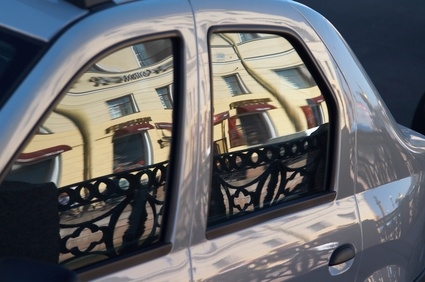
Tinted windows and privacy glass are used on automobiles for various purposes. For instance, the darker shade both tinted windows and privacy glass provide give more privacy when you are inside your vehicle, plus they help dissipate the heat outside, making your car's interior cooler and helping your air conditioning run more efficiently. Although tinted windows and privacy glass have similar functions, there are several characteristics that differentiate the two.
Privacy glass is known for giving privacy and allowing very little light inside your automobile. It consists of a glass that is naturally less transparent than other glasses; consequently, this type of shading lasts as long as the glass doesn't crack. A privacy glass is placed by the factory that manufactures your automobile, or by the factory that you specifically contract to make privacy glass windows for your car. Generally, the privacy glass is used on a car's back windows. In some instances, cars have privacy glass shading on the upper region of the windshield glass to protect your eyes from the sun when you drive.
Unlike privacy glass that is naturally manufactured with a less transparent glass, tinted windows are given a darker shading by applying tinting film to the windows. These tinting films come in various shades; however, the durability of a tinted window will depend on the quality to the tinting film and installation process. In some cases, tinted windows may develop air bubbles between the glass and the tinting film if the installation is not done properly. Therefore, if you are getting your windows tinted, it is best to choose quality tinting film that is called HP for "high performance," and you should have a reputable shop place the tinting film.
Before deciding whether you want to use tinted windows or privacy glass, there are some elements you must consider. For instance, tinting your windows is less expensive than buying privacy glass for your car. If money is not a problem, privacy glass is more durable and the quality of the glass is superior. In other words, privacy glass keeps people from being able to look inside your car, but you can see outside just as clearly as if the glass was transparent. However, with tinted windows this isn't always the case, because although tinting films keep people from seeing inside your vehicle, some tinting films also impair your visibility from the inside out.
In most states, it is against the law to tint your car's windshield and front door windows, or to use tints that shield more than 30 percent of the light. Privacy glass is generally manufactured to comply with tinting laws and that's why car manufacturers only use it for the back windows; however, if you are buying your own privacy glass from a third-party manufacturer, it is your responsibility to get privacy glass that complies with your state's tinting laws. Questions you must ask yourself prior to getting privacy glass or getting your windows tinted include: How dark can my tint be? and Can I tint my windshield, front side windows, back side windows or rear window? You also have to know how reflective your tint can be as well as the restricted tint colors in your state. To learn the laws in your state, visit the Northern Tint website and click on your specific state (see Resources), or call your local law enforcement agency. It is important to know your state's tinting laws before making any changes to your vehicle's windows.